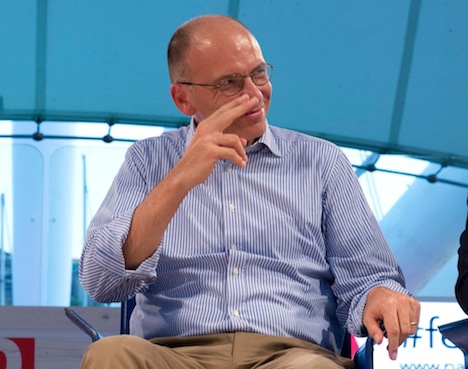For one day, at least, gerontocratic Italy was no country for old men.![]()
In his address to the Italian Senato (Senate), center-left prime minister Enrico Letta, just five months into the job, quoted former postwar Italian president Luigi Einaudi to announce as much to his allies and enemies alike in a speech that preceded a confidence vote for his beleaguered government:
Nella vita delle istituzione l’errore di non saper cogliere l’attimo puo’ essere irreparabile. [In the lives of nations, the mistake of not knowing how to seize the fleeting moment is irreparable.]
Italian politics, if nothing else, provides many fleeting moments, and Letta (at age 47, one of Italy’s youngest prime ministers) today seized a huge victory, as did Angelino Alfano, the 42-year-old center-right deputy prime minister and minister of the interior. Both seized their moments at the expense of 77-year-old Silvio Berlusconi, who remains the central figure in Italian politics 19 years after his first election as prime minister — though perhaps not for much longer.
Letta easily won a vote of confidence in his government after a showdown that ultimately caused more damage to Italy’s centrodestra (center-right) than to Letta’s government that began four days ago when Berlusconi tried to pull his party’s five ministers out of the current coalition government and thereby end Letta’s short-lived government in favor of early elections.
Alfano, Berlusconi’s top deputy, defied Berlusconi by indicating he would vote to support Letta’s government. With Alfano, other current ministers and at least 25 rebels from Berlusconi’s Popolo della Libertà (PdL, People of Freedom) prepared to do the same, Berlusconi himself relented at the last minute and instructed all of the PdL’s senators to support Letta, who thereupon easily won a vote of no confidence by a margin of 270 to 135. Letta leads an unwieldy grand coalition of center-right PdL senators, senators from Letta’s center-left Partito Democratico (PD, Democratic Party) and a handful of centrist, Christian Democratic and other pro-reform senators who support former technocratic prime minister Mario Monti.
But neither Letta’s victory nor Berlusconi’s retreat will come close to solving the problems Italy, its government, its economy, its political system and its political parties face in the months ahead: Continue reading Letta survives no-confidence vote easily as Berlusconi suffers humiliating defeat

